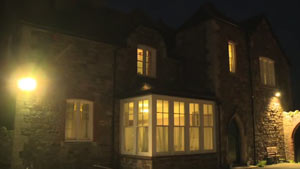Glossary for teachers
- Alternating current: An electric current that reverses directions at regular intervals (typically 60 times a second); abbreviated "AC." This current is found in homes.
- Ampere, Amps: The measurement of the flow of an electric current through a conductor.
- Anemometer: An instrument for measuring wind speed and velocity.
- Battery: A single electric cell, or group of connected cells, that produces a direct electric current.
- Biomass: Organic materials such as plants and animal waste that can be used as a fuel.
- Blackout: The total loss of electric power supplied by the electric company.
- Cell: A container filled with a chemical substance consisting of electrodes and electrolytes that produce an electric current by chemical action.
- Charge: Electricity produced by a surplus (positive) or shortage (negative) of electrons in an object.
- Circuit: A complete or partial path followed by a flow of electric current.
- Conductor: A substance or material that allows electrons, or electrical current, to flow through it.
- Current: The flow of electricity through a conductor.
- Direct current: An electric current flowing in only one direction; abbreviated "DC".
- Dynamo: The first type of large generator developed for a power plant.
- Electricity: The phenomena arising from the behavior of electrons and protons that is caused by the attraction of particles with opposite charges and the repulsion of particles with the same charge.
- Electrolysis: The production of chemical energy by passing an electric current through a liquid called an electrolyte.
- Electromagnet: A coil of wire that is wrapped around a soft iron core that is magnetized when electric current flows through it.
- Electron: A negatively charged particle that rotates around the nucleus of an atom.
- Energy: The power for doing work.
- Fuel cell: A device in which a fuel, such as hydrogen gas, is combined with oxygen to produce electricity, water, and heat.
- Fuse: A safety device with a metal wire or strip that melts when the current gets too strong, cutting off the flow of the electrical current.
- Generator: A machine for producing electrical current when rotated by an external driver such as a turbine.
- Geothermal energy: The heat energy that is stored below the earth's surface.
- Ground: A connection from an electrical circuit to the earth.
- Grid: The power highways for electricity, including substations and large power lines.
- Hydroelectricity: Electric energy made by the conversion of energy produced from running water.
- Insulator: An object or material that does not let electricity pass through it.
- Kilowatt (kW): A unit for measuring electrical energy.
1,000 watts = 1 kilowatt - Kilowatt Hour (kWh): The use of 1,000 watts of electricity for one full hour.
1 kWh = ten 100 watt bulbs all burning at the same time for one hour.
10 bulbs x 100 watts each x 1 hour = 1,000 watts hours or 1kWh. - Lightning: A static electrical discharge between two clouds or between a cloud and the earth accompanied by a flash of light.
- Load: The power output of a generator or power plant. Also, the resistance of a device to which power is delivered.
- Magnet: An object surrounded by a magnetic field that has the ability to attract iron or steel.
- Magnetic field: A detected force that exists around a magnet.
- Mechanical energy: The energy of motion used to perform work.
- Megawatt: One million watts, or 1,000 kW.
- Meter: An instrument that records or regulates the amount of something passing through it, like electricity, water, or gas.
- Motor: A machine that produces motion or power for doing work.
- Nuclear power: The energy produced by splitting atoms in a nuclear reactor.
- Ohms: The unit of measurement of the electrical resistance of a material to the flow of current.
- Photosynthesis: The process in which green plants absorb the energy of sunlight to produce carbohydrates from carbon dioxide and water in the presence of chlorophyll.
- Photovoltaic: Capable of producing a voltage when exposed to light or other radiation.
- Power: The force or energy used to do work.
- Radio: The sending or receiving of messages or effects, like sound, by means of electromagnetic waves through the air without a connecting wire.
- Resistance: The opposition of a body or substance to electric current passing through.
- Socket: A hollow opening or cavity into which something fits, such as an electric light socket.
- Solar energy: Energy produced by the action of the sun's light or heat.
- Static electricity: An electrical charge that builds up due to friction between two dissimilar materials. Friction removes some electrons from one object and deposits them on the other.
- Switch: A device for connecting, breaking, or changing the connections in an electrical circuit.
- Thermal: Of, using, producing, or caused by heat.
- Transformer: A device that raises or lowers the voltage or force of AC electricity.
- Turbine-generator: A machine in which the energy of a moving fluid, such as water or steam, is converted to mechanical power that drives an electric generator.
- Volt: A unit for measuring the force used to produce an electric current; the push or force that moves electric current through a conductor.
- Watt: A unit for measuring electric power.
1 Kilowatt = 1000 watts.
1 Megawatt = 1,000,000 watts. - Wind turbine: A machine that captures the energy of the wind and transfers the motion to an electric generator shaft.

